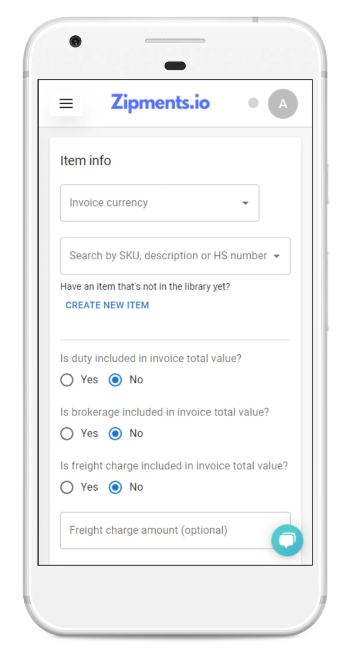If you are involved in importing or exporting goods, you likely understand the importance of...
Is There a Difference Between a Customs Invoice and a Commercial Invoice?
Getting your international shipping right can make all the difference when it comes to getting your goods delivered on time. International trade is dependent on a group of important documents, including a customs or commercial invoice. Though similar, a commercial invoice and customs invoice are two different documents used in the process of international shipping, and their purpose varies. In order to complete all your required paperwork correctly, it is important to understand what each of these documents is, and the role they serve.
.jpg?width=1920&height=1080&name=Blue%20Illustrated%20Dots%20Hosting%20Provider%20Presentation%20(11).jpg)
Customs Invoice vs. Commercial Invoice: What’s The Difference?
Customs invoices act as a bill of sale in advance delivery of products, making it a key document in international trade transactions, especially used for high value orders. Since goods are arriving from another country in international trade, there may be added fees a shipment will incur on the way to its destination, so the customs invoice would be an estimated bill of sale, until the duty or tax is determined at customs.
The customs invoice contains information of the contents of the shipment and is used by customs officials to determine if a shipment can enter the country, as well as any duties, taxes or fees on the product. Customs invoices provide confirmation that goods are shipped or imported in compliance with international trade law, customs laws and regulations of the country you are importing to. The document reflects compliance with commercial regulation and allows customs to calculate all of the fees, so that a final sale amount for the shipment can be deduced.
Differences Between Customs Invoices and Commercial Invoices
Customs invoices are submitted once both parties agree on payment amount, and then they are used in cross-border to help ship and receive goods. The final bill is usually settled after goods clear customs, and duties and taxes are calculated. Unlike with a commercial invoice, a customs invoice allows businesses to ship and receive goods, and then settle the final bill after customs clearance.
Commercial invoices, however, are usually used in smaller sales or by smaller merchants, because in this instance the seller has already received the payment for the goods or the exact amount has been agreed on. Customs invoices are an extended version of the commercial invoice, where more information is included on a customs invoice than on a regular commercial invoice. In international shipping, customs invoices usually replace or accompany the commercial invoice, but the necessity and type of customs invoice will be dependent on the country you are importing to.
The differences between a customs invoice and a commercial invoice lie in their purpose and usage. Customs invoices are legal documents used in international trade for customs clearance, taxation, and compliance in import/export regulation. The customs invoice contains more information on a shipment, including country of origin, in order to verify authenticity of goods. Commercial invoices are sale documents and used for accounting or taxation purposes, usually.
What Information Is Required On a Customs Invoice?
Your customs invoice form needs to contain more detail on the goods and shipment than a standard commercial invoice might. Some information that the customs invoice needs to contain includes:
- Detailed Description of Goods
- Quantity and Weight of Goods
- Addresses and Names of Shipper and Consignee
- Unit Price
- Total Price
- Country of Origin
- HS Code
- Invoice Number
Can You Use a Commercial Invoice Instead of a Customs Invoice?
Some countries will require a customs invoice in addition to a commercial invoice, so it will be important to understand how to create the document correctly, and what the requirements are for the specific country you are importing to. Remember that each country has different regulations pertaining to the type of customs invoice required. Canada for instance requires the Canada Customs Invoice document (CCI), which has to be accompanying a shipment at customs.
Importers use the Canada Customs Invoice to pay for goods while the seller uses the CCI to collect payment. You could use a commercial invoice in place of a CCI, but it would need to contain more information than the standard commercial invoice in order to be acceptable, so you are better off filling out a standard CCI.
Some of the information that needs to be on a CCI includes:
- Exporter and Importer Contact and Addresses
- Net and Gross Weight
- Detailed Description of Goods
- Freight Charges or Insurance
- Import License When Applicable
- Incoterms or Terms of Delivery/Payment
- Currency Used For Payment
- Unit Price of Each Item
- Date Goods Began Transporting
- Purchaser’s Order Number
- HS Codes
In preparing your documents, it is important to remember that there should be a minimum of 2 copies of the CCI printed, attaching one to the Bill of Lading (BOL) and another to the shipment at customs.
Create a Customs Invoice For Free With Zipments

Even if you are using a broker to clear your goods with customs, you will still need to fill out a customs invoice form. It is necessary to ensure you meet customs invoice requirements for the country you are shipping or importing to, in order to avoid delays and challenges at the border.
Procuring the right customs invoices for your international shipment is an important step in the process. When you use Zipments completely free Customs Invoice Forms, you can complete your customs invoice within minutes, with less hassle than the traditional paperwork.
Zipments provides an easy to fill out template, with AI technology used to generate the correct tariff or HS Code automatically for you, so that you don’t have to spend hours researching the correct code.
✅Your customs invoice with Zipments can be easily transmitted to your carrier or customs broker, for seamless communication and processing.
✅You can avoid missing any details with an easy to follow template.
When you are selling internationally, it is important to prepare all the relevant paperwork and information, in order to avoid any issue. Your customs invoice for international shipments is a mandatory form when importing your goods into a country, and can make all the difference. It is important that you fill out this form correctly, so that the importer knows about the goods and products, customs requirements and charges. Filling out a customs invoice correctly ensures that your goods won’t be delayed, slowing down the sale of your shipments.



.png?height=200&name=Grey%20Modern%20Professional%20Business%20Project%20Presentation%20(3).png)
).png?height=200&name=Minimalist%20%20Pink%20White%20Sale%20Announcement%20%20(Banner%20(Landscape)).png)
.png?height=200&name=Blue%20White%20Modern%20Business%20Blog%20Banner%20(3).png)